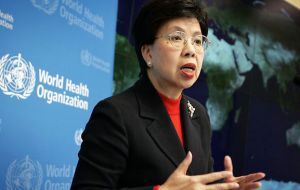MercoPress. South Atlantic News Agency
WHO admits full-scale battle with tobacco industry, which appeals to 'devious channels'
 Director-General Dr Chan said “the tobacco industry fights back, harder and through every possible channel, no matter how devious those channels and practices are.”
Director-General Dr Chan said “the tobacco industry fights back, harder and through every possible channel, no matter how devious those channels and practices are.”  ”WHO...continue to assist Parties in accelerating the implementation of the Treaty,” said Dr Vera Luiza da Costa e Silva, Head of the Convention Secretariat.
”WHO...continue to assist Parties in accelerating the implementation of the Treaty,” said Dr Vera Luiza da Costa e Silva, Head of the Convention Secretariat. The sixth session of the Conference of the parties (COP6) to the WHO Framework Convention on Tobacco Control (FCTC) concluded in Moscow. Several landmark decisions were adopted in the course of the six-day session, regarded as one of the most successful in the WHO FCTC’s history.
In her opening speech, WHO Director-General Dr Margaret Chan said that “as implementation of the Framework Convention reaches new heights, the tobacco industry fights back, harder and through every possible channel, no matter how devious those channels and practices are.”
Despite increased efforts by tobacco industry to undermine the WHO FCTC, important decisions were passed.
“Parties have taken courageous steps forward in a number of areas and I am pleased by the guidance to the Secretariat to scale up our collaboration with international organizations to reduce tobacco use, while continuing to assist Parties in accelerating the implementation of the Treaty,” said Dr Vera da Costa e Silva, Head of the Convention Secretariat.
One of the first decisions approved by the Parties was on the Article 6 guidelines, devoted to tax measures to reduce the demand for tobacco. Tobacco taxation is a very effective tool for influencing the prices of tobacco – higher taxes usually lead to higher prices, which in turn lead to lower consumption.
The regulations provide for tax rates to be monitored, increased and adjusted annually, taking into account inflation and income growth. At the same time, all tobacco products should be taxed in a comparable way to prevent substitutions of the use of one product with another.
Several measures aimed at restricting tobacco industry interference were decided by the parties, which concern implementation of Article 5.3 of the WHO FCTC. These include request the Convention Secretariat to continue providing technical support to the Parties, and to engage with international organizations on the matters of tobacco companies’ influence.
Another milestone in tobacco control was adoption of the decision on electronic nicotine (and non-nicotine) delivery systems, also known as electronic cigarettes. This rather novel product was first launched by independent companies, but many of them are now being controlled by multinational tobacco companies.
The decision allows Parties to prohibit or regulate these products as they see fit, whether as tobacco, medicinal, consumer or any other product category, and urges Parties to consider banning or restricting promotion, advertising and sponsorship of these products.
COP6 honored the tradition of the previous conferences and adopted the Moscow Declaration. Noting that the heaviest burden of tobacco related diseases is borne by the most vulnerable population groups, the Declaration calls on the parties to strengthen international collaboration on tobacco control and attain a voluntary global target of 30% prevalence reduction by 2025.
The President of the COP Bureau, Professor Chang Jin Moon, said that many other significant decisions were made and “it is clear that the Parties are supportive of continuing to raise the profile of the WHO FCTC in the international arena and on global health agenda.”
These decisions include:
• Proposals for regulation of smokeless tobacco and water pipe products;
• Recommendations for entry into force of the Protocol to Eliminate Illicit Trade in Tobacco Products;
• Continuing to work on Article 19 on liability of tobacco companies;
• Articles 17 and 18 principles addressing sustainable alternative livelihoods for tobacco growers;
• Trade and investment issues related to FCTC implementation;
• Assessment of the Convention’s impact on tobacco epidemic.
Together, these decisions will help move forward the treaty, which entered into force in February 2005. The number of Parties to the Convention is 179 as of today. It is the fastest ratified treaty in the UN history. Conference of the Parties is the governing body of the Convention, which meets regularly to review progress of the Convention and takes the decisions necessary to promote its effective implementation.




Top Comments
Disclaimer & comment rules-

-

-

Read all commentsWell. I guess we now know what the World Heath Organization is focusing on while the worst Ebola outbreak in history is killing thousands of West Africans weekly.
Oct 20th, 2014 - 02:06 pm 0One would think the whole purpose of WHO would be to prepare, plan and coordinate resources for a major infectious disease outbreak larger then the capacity of individual counties to deal with. You know, like Ebola in west Africa.
So while thousands are dying and the plague continues to grow and spread its death. WHO is having a great time bashing tobacco and telling national governments how much more to tax their own citizens.
Somehow there must be money in it for the WHO.
http://en.wikipedia.org/wiki/Margaret_Chan
Oct 20th, 2014 - 03:22 pm 0Might be worth a look. She's got two degrees in 'Home Economics'.
Notably, “After the first victim of the H5N1, Chan first tried to reassure Hong Kong residents with her infamous statements like, ”I ate chicken last night“ or ”I eat chicken every day, don't panic, everyone“. When many more H5N1 cases appeared, she was criticised for misleading the public.”
Still, she's female and 67. And those 'Home Economics' degrees. How does that work? Well, there has to be 'gender balance'. Senility, anyone? Important features of 'Home Economics' include not getting the ashtrays dirty or, preferably, have no ashtrays at all. And I didn't think you needed two degrees to heat up a 'Pot Noodle'.
@ 1
Oct 20th, 2014 - 10:34 pm 0What makes me really irate is how governments across the globe deal with the tobacco/taxation issue.
They claim the moral high-ground by increasing YOY taxation at a steady, gentle rate by saying this decreases smoking-levels amongst the population, True, but;
By doing this at a few pennies/cents etc they are no worse than drug-dealers as the addict can always find 'a little more'. If they were serious about this, the price (inc. tax obviously) would instantly rise to something unobtainable for the average person. Thus causing The Prohibition Effect that failed in the USA re: alcohol.
Education is the only way forward.
They need the Tax $ and are lying to us because they can't figure out a way to find the extra money.
Sure, smoking is a 'bad thing' but I hate the hypocrisy.
@2
This patronising, woman-hating, thing is getting boring now.
Sort yourself out. Maybe find a lady companion to play golf with, or whatever your hobbies are that don't involve war-gaming.
Commenting for this story is now closed.
If you have a Facebook account, become a fan and comment on our Facebook Page!